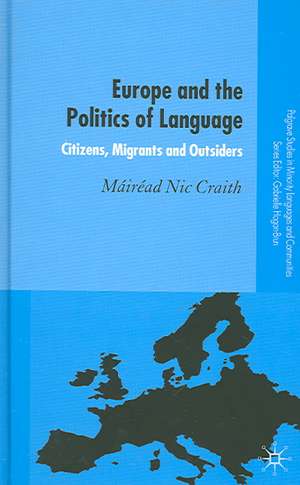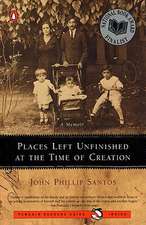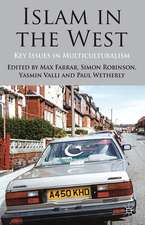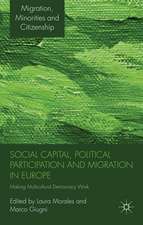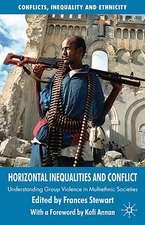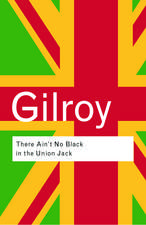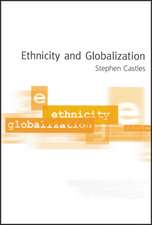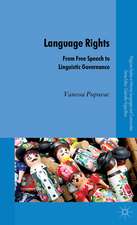Europe and the Politics of Language: Citizens, Migrants and Outsiders: Palgrave Studies in Minority Languages and Communities
Autor Kenneth A. Loparoen Limba Engleză Hardback – 15 dec 2005
| Toate formatele și edițiile | Preț | Express |
|---|---|---|
| Paperback (1) | 635.15 lei 43-57 zile | |
| Palgrave Macmillan UK – 2006 | 635.15 lei 43-57 zile | |
| Hardback (1) | 639.41 lei 43-57 zile | |
| Palgrave Macmillan UK – 15 dec 2005 | 639.41 lei 43-57 zile |
Din seria Palgrave Studies in Minority Languages and Communities
- 20%
 Preț: 569.78 lei
Preț: 569.78 lei - 15%
 Preț: 639.25 lei
Preț: 639.25 lei - 18%
 Preț: 942.94 lei
Preț: 942.94 lei - 18%
 Preț: 942.63 lei
Preț: 942.63 lei - 15%
 Preț: 586.70 lei
Preț: 586.70 lei -
 Preț: 385.84 lei
Preț: 385.84 lei -
 Preț: 388.72 lei
Preț: 388.72 lei - 18%
 Preț: 787.91 lei
Preț: 787.91 lei -
 Preț: 392.60 lei
Preț: 392.60 lei - 15%
 Preț: 641.38 lei
Preț: 641.38 lei - 15%
 Preț: 639.90 lei
Preț: 639.90 lei - 18%
 Preț: 790.46 lei
Preț: 790.46 lei -
 Preț: 389.70 lei
Preț: 389.70 lei - 15%
 Preț: 640.88 lei
Preț: 640.88 lei - 15%
 Preț: 641.85 lei
Preț: 641.85 lei - 18%
 Preț: 946.24 lei
Preț: 946.24 lei -
 Preț: 386.99 lei
Preț: 386.99 lei -
 Preț: 389.11 lei
Preț: 389.11 lei - 15%
 Preț: 647.40 lei
Preț: 647.40 lei -
 Preț: 390.63 lei
Preț: 390.63 lei -
 Preț: 392.60 lei
Preț: 392.60 lei -
 Preț: 380.45 lei
Preț: 380.45 lei - 15%
 Preț: 640.55 lei
Preț: 640.55 lei - 15%
 Preț: 644.63 lei
Preț: 644.63 lei -
 Preț: 389.11 lei
Preț: 389.11 lei - 15%
 Preț: 643.34 lei
Preț: 643.34 lei - 15%
 Preț: 589.14 lei
Preț: 589.14 lei - 18%
 Preț: 1010.79 lei
Preț: 1010.79 lei -
 Preț: 390.63 lei
Preț: 390.63 lei - 18%
 Preț: 729.36 lei
Preț: 729.36 lei - 15%
 Preț: 645.79 lei
Preț: 645.79 lei
Preț: 639.41 lei
Preț vechi: 752.24 lei
-15% Nou
Puncte Express: 959
Preț estimativ în valută:
122.35€ • 128.07$ • 101.83£
122.35€ • 128.07$ • 101.83£
Carte tipărită la comandă
Livrare economică 31 martie-14 aprilie
Preluare comenzi: 021 569.72.76
Specificații
ISBN-13: 9781403918338
ISBN-10: 1403918333
Pagini: 217
Ilustrații: XII, 217 p.
Dimensiuni: 140 x 216 x 19 mm
Greutate: 0.39 kg
Ediția:2006
Editura: Palgrave Macmillan UK
Colecția Palgrave Macmillan
Seria Palgrave Studies in Minority Languages and Communities
Locul publicării:London, United Kingdom
ISBN-10: 1403918333
Pagini: 217
Ilustrații: XII, 217 p.
Dimensiuni: 140 x 216 x 19 mm
Greutate: 0.39 kg
Ediția:2006
Editura: Palgrave Macmillan UK
Colecția Palgrave Macmillan
Seria Palgrave Studies in Minority Languages and Communities
Locul publicării:London, United Kingdom
Cuprins
Acknowledgements List of Tables List of Maps List of Abbreviations Acknowledgements Series Editor's Preface PART 1: EUROPE: DISCOURSES OF INCLUSION AND EXCLUSION Conceptions of Europe Divergence and Divisions Inclusion/exclusion and Citizenship Conclusion PART 2: STATEHOOD, CITIZENSHIP AND LANGUAGE Community, Language and Citizenship Language and Statehood: A Case Study from the Balkans Citizenship and Language: The Baltic States Conclusion PART 3: THE EUROPEAN ELITES: OFFICIAL LANGUAGES IN THE EU Official, Working Languages Towards a Lingua Franca Citizens and their Languages Conclusion PART 4: 'A HIERARCHY OF LEGITIMACIES': MINORITY LANGUAGES Minority Languages and National Ideologies A Hierarchy of Minority Languages The Transnational Context Conclusion PART 5: LANGUAGES ACROSS BORDERS Ethnic Conflicts and State Boundaries Impediments to Cross-border Co-operation European Support for Transfrontier Co=operation Conclusion PART 6: THE QUEST FOR RECOGNITION: CONTESTED LANGUAGES Language, Boundary, Identity Language and Legitimacy The European Context Conclusion PART 7: NOMADS, LANGUAGE AND LAND Identities and Lifestyles The Significance of Language Land, Region and Space Conclusion PART 8: THE OUTSIDERS: NON-EUROPEAN LANGUAGES Immigrants in Europe Non-European Languages in Western Europe The Discourse of Autochthony Conclusion PART 9:EUROPE AND THE POLITICS OF BELONGING Europe and its Languages The Implications of Equality Revising Language Policies in Europe Conclusion Select Bibliography Index
Recenzii
'...an outstanding contribution to the field of language policy and planning...This is ahighly recommended bookfor graduate and upper-division undergraduate courses, written in a clear and very persuasive style that reflects Nic Craith's extensive knowledge of European realities and her long-term commitment to the idea of expanded human rights.' - Eva Yerendé, Language Policy
'...an up-to-date, well-researched and well-expressed volume...dealing at length with traditionally ignored matters - nomads, contested languages, cross-border situations...These are new, European issues, and the book is excellent at identifying them.' - Journal of Multilingual and Multicultural Development
'It shows how the study of language planning can offer a deeper understanding of social disparities in a broader sense and how a more intensive commitment to this field of research could make an important contribution to a more equitable and democratic Europe.' - Journal of Sociolinguistics
'Mairead Nic Craith takes readers on a vicarious European tour, one which includes an array of cultures and a cacophony of languages and is illuminating to the sociolinguistic issues that are found within the European Union.' - Education Review
'This is an ambitious book...Its focus is on Europe but its potential influenceand contribution go much wider, as the politics of language is present everywhere.' - International Journal of Applied Linguistics
'I wouldrecommend the book as an addition to a syllabus for an advanced undergraduate or graduate-level class on
European studies or language policy... it would serve as a basis for engaging students in a discussion and critique of current laws, practices and ideological positions on languages and language politics in Europe.' - Bridget Goodman, Current Issues in Language Planning
Mairead Nic Craith deals with the diverse issues involved in a distinctive and up-to-date manner. Thus, she examines the complex polititcs of language at various political-geographical scales... [her] academically authoritative but readable book provides a wide range of insights into why many people continue to feel a deep attachment to their native and/or national tongues... this authoritative book can be usefully read with interest and ease by the serious academic, the undergraduate student and any literate lay reader interested in how a whole range of languiage issues continue to influence politics in contemporary Europe and will continue to do so.' Mark Wise, Ethnopolitics
'...an up-to-date, well-researched and well-expressed volume...dealing at length with traditionally ignored matters - nomads, contested languages, cross-border situations...These are new, European issues, and the book is excellent at identifying them.' - Journal of Multilingual and Multicultural Development
'It shows how the study of language planning can offer a deeper understanding of social disparities in a broader sense and how a more intensive commitment to this field of research could make an important contribution to a more equitable and democratic Europe.' - Journal of Sociolinguistics
'Mairead Nic Craith takes readers on a vicarious European tour, one which includes an array of cultures and a cacophony of languages and is illuminating to the sociolinguistic issues that are found within the European Union.' - Education Review
'This is an ambitious book...Its focus is on Europe but its potential influenceand contribution go much wider, as the politics of language is present everywhere.' - International Journal of Applied Linguistics
'I wouldrecommend the book as an addition to a syllabus for an advanced undergraduate or graduate-level class on
European studies or language policy... it would serve as a basis for engaging students in a discussion and critique of current laws, practices and ideological positions on languages and language politics in Europe.' - Bridget Goodman, Current Issues in Language Planning
Mairead Nic Craith deals with the diverse issues involved in a distinctive and up-to-date manner. Thus, she examines the complex polititcs of language at various political-geographical scales... [her] academically authoritative but readable book provides a wide range of insights into why many people continue to feel a deep attachment to their native and/or national tongues... this authoritative book can be usefully read with interest and ease by the serious academic, the undergraduate student and any literate lay reader interested in how a whole range of languiage issues continue to influence politics in contemporary Europe and will continue to do so.' Mark Wise, Ethnopolitics
Notă biografică
MÁIRÉAD NIC CRAITH is Professor of Irish Culture and Language at the University of Ulster, UK. She has published extensively on languages and cultures in Europe and was joint winner of the 2004 Ruth Jena Michaelis Research Prize for folk life. Máiréad has worked closely with different European organizations including the European Bureau for Lesser-Used Languages.
